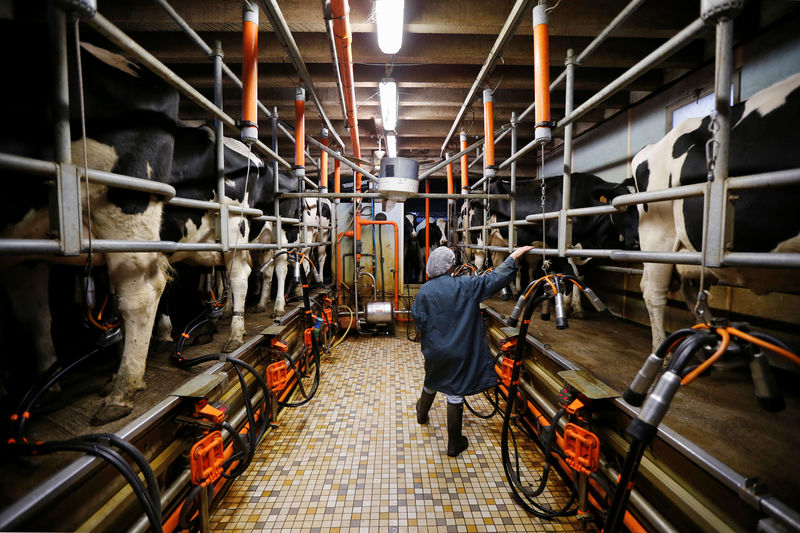By Gus Trompiz
PARIS (Reuters) - When Chinese baby formula-maker Synutra opened a huge new factory in western France last month with a ceremony of Breton dancing and fireworks, the boss praised the "unbeatable quality" of French milk.
The decision to invest 170 million euros in the plant after a 2008 scandal over tainted milk in China is a sign of renewed confidence in Europe's dairy farmers, who are struggling and demoralised after a two-year plunge in prices.
The green fields of Europe's northwestern dairy heartland, from Ireland to Germany, provide a reliable source of high-quality milk to meet rising consumption in Asia.
Although the Synutra deal, and several others like it across Europe, has been in the pipeline for a while, the demand could help sustain a rebound in the price of raw milk at the farm gate in the 28-nation European Union from the seven year low it had sunk to in July.
Prices had been falling due to oversupply after EU quotas were scrapped last year, Russia banning Western food imports and weaker Chinese dairy imports but a pickup in demand and tighter EU supplies have turned them around.
For some dairy processors, the signs of recovery in the EU dairy market have been bad news. Shares in Britain's Dairy Crest fell sharply after it warned that rising farmgate prices could squeeze its margins.
French company Lactalis, the maker of "President" brie cheese, Dutch company FrieslandCampina, whose products include yoghurt and Yazoo drinks and Germany's Muller have all recently raised prices paid to milk farmers.
Europe's farmers still have a way to go before they receive a price they consider to be "break even" but the appreciation of companies like Synutra are an encouraging first sign.
"Here we've found a raw material that is among the best quality in the world, and where we are able to trace the supply chain," Liang Zhang, chief executive officer of China's third largest infant milk producer said at the factory opening in Carhaix.
"That allows us to add value in the Chinese market."
The factory will process some 288 million litres of milk annually from 800 local farmers under a 10-year supply deal.
Europe's farmers are hopeful that the rise in prices from 26.40 euros per 100 kg in August was the start of a turnaround after reaching 25.63 euros in July, according to data from the European Commission.
The Commission is expecting a second consecutive rise in prices in September to 26.99 euros, and analysts expect a gradual recovery into next year that could bring prices back above 30 euros per 100 kg - which works out at about 30 cents a litre -, often considered as a break-even threshold for farmers in western Europe.
An EU scheme to subsidise farmers to reduce production could add impetus after it was fully subscribed for 1 million tonnes.
"Dairy continues to be something the world wants and it's something that is difficult to produce," Matt Johnson, an analyst with Rabobank, said.
VERY, VERY CAUTIOUS
The EU last year scrapped the milk quotas it had put in place in 1984 to end the oversupply that led to milk lakes and butter mountains piling up in storage. Fines were imposed on producers going over quota.
Many farmers were hopeful that demand would increase once quotas were removed. Farmers in Ireland, the Netherlands and Germany expanded in the run-up to the abolition of quotas.
But this coincided with demand from Russia, previously the biggest importer of EU cheese, dropping off following its embargo on many Western food products. Chinese dairy demand also eased after a buildup of stocks.
Favourable weather conditions in the major dairy areas of Australia, New Zealand, the U.S. and the EU also boosted supply, sending prices even lower.
Even with a brighter outlook, farmers are still feeling the pain and are worried about the future.
This concern was evident in August when several thousand French dairy farmers protested for over a week outside the headquarters of Lactalis, the world's largest dairy firm to demand higher prices for their milk.
The EU announced its 500 million euro subsidy package for farmers in mid-July, part of which was to encourage milk producers to cut output and reduce overproduction. France announced further aid after the Lactalis protests.
Ireland was at the forefront of the EU's post-quota expansion plans. The government set a target of a 50 percent rise in production by 2020 and farmers ramped up production despite falling prices.
But Irish output growth is now slowing sharply and could show a year-on-year fall in the coming months.
"There is a realisation that volatility is going to be part and parcel of milk production into the future," said Sean O'Leary, chairman of the Irish Farmers' Association Dairy Committee, who farms in Cork county in the southwest.
Hefty stocks are lurking in the world market, including more than 300,000 tonnes of skimmed milk powder sold into the EU's public storage scheme during the slump.
The granting of EU subsidies to curb production just as prices are rising could prove a "double whammy" next spring if farmers use refound liquidity to raise output again, Johnson said.
"We are being very, very cautious," said Christine Vazeille, a dairy farmer in a mountainous part of the Auvergne region in central France.
"Experience has shown us you have to avoid projecting yourself too far ahead if you don't want to fall back just as quickly."
EU policy is also uncertain, marked by disagreement over how to regulate the market and Britain's planned exit from the bloc.
Politicians have urged all farmers to use price-hedging to adapt to market swings, but such financial instruments are little used in dairy farming.

"We're emerging from 30 years of an administrated market. Change will come step by step," Adrien Pierre, dairy analyst with Agritel, said.
(additional reporting by Conor Humphries in Dublin, Pierre-Henri Allain in Carhaix, France, and Michael Hogan in Hamburg; Editing by Veronica Brown and Anna Willard)